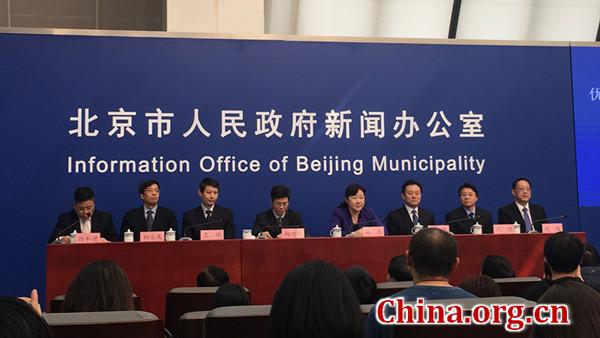Beijing to further optimize business environment
- By Cui Can
 0 Comment(s)
0 Comment(s) Print
Print E-mail China.org.cn, March 19, 2018
E-mail China.org.cn, March 19, 2018
Beijing plans to further optimize the business environment, in a bid to stimulate market vitality and social creativity, the city announced at a press conference on March 18.

Yang Xuhui, deputy director of the Beijing Municipal Commission of Development and Reform, said optimizing the business environment would help to improve the city's productivity and competiveness, which is significant for building Beijing into a world-class metropolis featuring high-quality development.
The government has mulled over a total of nine major polices with regard to tax payments, cross-border trade, approval of construction projects, business registration, financial credit and access to the power grid, with the aim to create a "stable, equitable, transparent and predictable" business environment.
The reform will emphasize on cutting red tape, slashing fees for business and increasing transparency, Yang said.
Beijing is home to over 1.55 million companies, more than doubling the number since 2013, when the city first initiated its business registration reform. This year, Beijing aims to ramp up more efforts to increase the efficiency of business registration, according to the officials at the press conference.
Registration for startup companies is expected to take as short as five days by the end of this March. Every district in Beijing will set up a one-stop service center for business registrations. By submitting applications online, startups could get their electronic business licenses within one to three days, city officials said.
In an effort to build a favorable business environment for both domestic and overseas companies, Beijing will take great efforts to facilitate cross-border trade. Through simplifying approval process, eliminating illegal fees, and implementing technology-based services, the city could greatly improve cross-border trade at the Beijing-Tianjin port, according to the officials.
Beijing will also take a series of measures to focus on application for construction permits, water, electricity and gas services, and real estate ownership registrations.
The city will establish a unified mechanism for evaluating construction projects. It has launched a new system to help small and micro enterprises access electricity, which would help to cut their electricity bills by about 1.2 billion yuan (US$190 million). Beijing will also establish an online platform for real estate ownership registrations, and over 90 percent of the applications are expected to be completed online by the end of this year.
In addition, the government will also step up efforts to promote transparency. Policies and measures on optimizing the business environment will be published on www.beijing.gov.cn and www.ebeijing.gov.cn, the official website of the Beijing Municipal Government in Chinese and English respectively, as well as on other related official websites.






Go to Forum >>0 Comment(s)